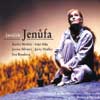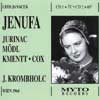Janácek Jenufa
One historic recording of considerable interest; and Haitink’s acclaimed production with Mattila a gripping lead
View record and artist detailsRecord and Artist Details
Composer or Director: Leoš Janáček
Genre:
Opera
Label: Erato
Magazine Review Date: 3/2003
Media Format: CD or Download
Media Runtime: 139
Mastering:
Stereo
DDD
Catalogue Number: 0927-45330-2

Tracks:
| Composition | Artist Credit |
|---|---|
| Jenufa |
Leoš Janáček, Composer
Anja Silja, Kostelnicka, Soprano Bernard Haitink, Conductor Eva Randová, Grandmother Buryja, Contralto (Female alto) Gail Pearson, Jano, Soprano Jerry Hadley, Steva, Tenor Jonathan Veira, Foreman of the Mill, Baritone Jorma Silvasti, Laca, Tenor Karita Mattila, Jenufa, Soprano Leoš Janáček, Composer Rebecca Nash, Barena, Soprano Royal Opera House Orchestra, Covent Garden |
Composer or Director: Leoš Janáček
Genre:
Opera
Label: Myto
Magazine Review Date: 3/2003
Media Format: CD or Download
Media Runtime: 136
Mastering:
ADD
Catalogue Number: MCD023266

Tracks:
| Composition | Artist Credit |
|---|---|
| Jenufa |
Leoš Janáček, Composer
Anny Felbermayer, Barena, Soprano Dagmar Hermann, Shepherdess, Mezzo soprano Elizabeth Höngen, Grandmother Buryja, Contralto (Female alto) Hans Braun, Mayor, Bass Hilde Konetzni, Old Woman (Tetka), Soprano Jaroslav Krombholc, Conductor Jean Cox, Steva, Tenor Leoš Janáček, Composer Ljubomir Pantscheff, Foreman of the Mill, Baritone Lucia Popp, Karolka, Mezzo soprano Martha Mödl, Kostelnicka, Soprano Olivera Miljakovic, Jano, Soprano Sena Jurinac, Jenufa, Soprano Vienna State Opera Chorus Vienna State Opera Orchestra Waldemar Kmentt, Laca, Tenor |
Author: hcanning
Krombholc was an outstanding Janácek conductor – his stereo Supraphon recording of Káta Kabanová had no rivals until Decca launched its award-winning series of the five great operas under Charles Mackerras – and he rarely relaxes the tension during Jenufa’s three pithy acts. But the Myto set is inevitably a ‘specialist’ issue. Sung in German, as was the practice in the German-speaking world until at least the 1970s, it remains treasurable for Sena Jurinac’s plangent-voiced, deeply moving heroine and for Mödl’s authority and psychological disintegration as her guilt-wracked stepmother, the infanticide sextoness (Kostelnicka) Buryovka. Waldemar Kmentt and Jean Cox are less convincing as Laca and Steva – the budding Canadian Heldentenor Cox has the heavier of the two voices and Kmentt’s basically lyric tenor sounds stretched beyond its limits. But there are vivid cameos from the veteran Elisabeth Höngen as Granny Buryovka and the very young Lucia Popp – in the year her sensational EMI Queen of Night under Klemperer was released – as Steva’s new sweetheart Karolka (she recorded the same role commercially 18 years later as a guest-star on the now-classic Mackerras recording).
Unsurprisingly, Haitink’s approach to Jenufa is more ‘romantic’ than either Krombholc’s or Mackerras’s and one which some Janácekians will undoubtedly find too soft-centred and lacking in theatrical frisson. Certainly in the great scene in which the Kostelnicka returns from drowning Jenufa’s baby in the icy waters of the river, Haitink misses the sheer terror Mackerras and the Vienna Philharmonic evoke as the wind blows open the window and the Kostelnicka imagines that Death is peering into her house – although his Kostelnicka, the veteran Anja Silja, is simply riveting here as she was (is always) in the theatre – horror-struck at the enormity of her crime. And Haitink’s warm-hearted interpretation brings its own rewards. In the theatre I don’t think I have ever been so moved by the opera’s closing pages as Jenufa forgives her step-mother and she and Laca look forward to a better life together. Karita Mattila and Jorma Silvasti sing so gloriously here, and Haitink’s orchestra plays so rapturously, that you almost forget that the conductor is using Janácek’s original score rather than the romanticised retouchings of Karel Kovarovic with its antiphonal horn motifs. The emotional catharsis of the live performance comes across almost as vividly here and for this scene alone I would urge all who love this wonderful opera to hear this new recording.
There is plenty more to enjoy too: on disc one is less bothered than in the theatre by Jerry Hadley’s portly middle-aged appearance as Steva and he seems in better voice than he did on the first night of the stage production, as does Eva Randová’s touchingly frail Granny, about whom I wrote rather unkindly in The Sunday Times (the recording having been taken from several performances). Randová is, of course, the only native speaker in the Covent Garden cast, which sounds inevitably less idiomatic in the original language than Mackerras’s, of which only Elisabeth Söderström’s Jenufa and Wieslaw Ochman’s Laca were non-Czechs: Randová is the Kostelnicka in that recording and from the purely vocal point of view she remains unsurpassed – a truly great piece of singing which Silja’s, for all her individuality and charisma, is not.
In sum, Haitink’s Jenufa clearly does not topple the Mackerras version from its pedestal but it is a deeply rewarding and, I think, valid alternative, especially collectable for Mattila’s heroine and Silvasti’s superlatively sung Laca.
Discover the world's largest classical music catalogue with Presto Music.

Gramophone Digital Club
- Digital Edition
- Digital Archive
- Reviews Database
- Full website access
From £8.75 / month
Subscribe
Gramophone Full Club
- Print Edition
- Digital Edition
- Digital Archive
- Reviews Database
- Full website access
From £11.00 / month
Subscribe
If you are a library, university or other organisation that would be interested in an institutional subscription to Gramophone please click here for further information.




